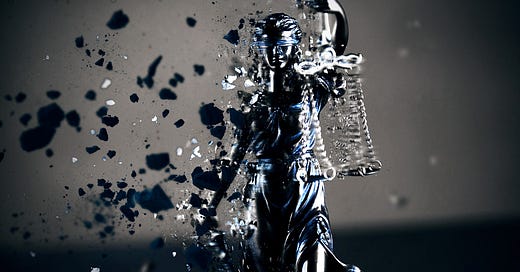As the regime jails political opponents, meme makers, and protesters while letting violent criminals roam the streets, it becomes increasingly difficult to pretend that we are a nation ruled by laws, not men. The rule of law is understood as a bedrock principle in a constitutional republic, but it has become clear that many Western democracies, America included, have discarded this fundamental axiom. In theory, these nations honor the rule of law as a core value, but in practice they have abandoned it almost simultaneously. Today we will be looking at Bertrand de Jouvenel’s seminal work "On Power" to help us understand why Western liberal democracies discarded the rule of law and embraced the total state.
De Jouvenel begins by defining his terms, explaining the critical difference between laws of nature, natural laws of society, and positive law. Laws of nature are physical laws, like gravity, to which all matter and all men must submit. If something is dropped from a height it must fall; the clever arguments of a lawyer will have no impact on this reality. Natural laws of society emerge from brute facts about their material conditions and the nature of humans in that community, but the members of that society still have agency. If the key water source in a village dries up, then the tribe must move to survive. The people can choose to stay in their village, but the natural consequence will eventually be death if action is not taken.
Moral and civil law usually begin as extensions of natural law, and as long as the power of the state confines itself to enforcing laws of this kind, its citizens maintain their dignity. The barriers placed around human action are aligned with natural consequences and the good that an individual would innately pursue. While there are rules, man is free to pursue virtue because the law is not arbitrary, and he can exert agency in the matters over which he would instinctively seek dominion. This is the ideal mode of state power, but de Jouvenel acknowledges that it is utopian; no government manages to restrict itself to this manner of law in perpetuity.
Positive law is initially created to buttress moral and civil law derived from nature, but it can quickly grow beyond its original scope. Inequality is the most natural of all truths, and the strong will seek laws to enshrine their advantage while the weak seek champions who would use the law to elevate them. While the law was initially bound together and made coherent by the natural circumstances and inherited traditions of society, great and sudden shifts in circumstance can give rise to factions that quickly assemble an array of positive law in their favor.
Law ceases to reflect the natural disposition and folkways of the people and instead becomes a momentary tool of situational advantage wielded by divergent interests. Man loses dignity because he can no longer freely pursue virtue; he is instead bound by arbitrary dictates that no longer align with the natural laws of society.
De Jouvenel does not dismiss the plight of the dispossessed, claiming that they often hold legitimate grievances against social ills caused by times of massive upheaval, when those who hold power take advantage of instability. Positive legislation is often called upon to adjust the social framework when rapid changes take place.
No social reality remains static and change must inevitably come, but positive law always proves unequal to the task. Ideally, legislative remedies would be thoroughly considered and carefully crafted, but in reality the making of laws is generally a rushed, emotional, and greedy exercise. While legislation is called upon to remedy real problems, its creation is usually sloppy, shortsighted, and arbitrary. The general disorder of capricious positive law becomes the answer to the specific disorder of societal upheaval.
As civilizations expand and increase in complexity, they embrace division of labor, which creates additional social stratification and widens the disparities between social classes. This in turn increases the chances of factionalism. Citizens now lead very different lives inside the state and rely on a high degree of social coordination. Religion and social heredity play a key role, binding the very different lives of distinct social classes together, orienting them toward a common goal in a predictable and reliable pattern. The traditions and folkways that had naturally arisen from the character and shared experience of the people now must be carefully passed down from one generation to the next if they are to hold the different social classes fast to a common purpose.
The balance between expansion and social cohesion is delicate, requiring the steady hand of a ruling class that understands the cost of trading long-term stability for its own short-term gain. Rulers who are too eager to indulge in personal enrichment or the accrual of power can easily rupture the social contract by enshrining factional interests in law, warping the system around their temporary desires. Mass expansion through colonization or immigration can provide rapid expansion due to the influx of raw materials and labor, but also threatens social cohesion. The more complex civilization relies heavily on the transmission of traditions and cultural norms to create social continuity, and new arrivals, if left unassimilated, can disrupt overall coordination. Rapid changes due to revolutionary technological advancement can also heavily disrupt social coordination as each faction struggles to find its place and fight for power inside a shifting paradigm.




Several times while reading I found myself thinking of Adorno and Lukács. Strange times indeed: early 21st-century conservatives rhyming with early 20th-century Marxists.
Still need to read this one, but I know Hoppe's DTGTF is partly inspired by On Power's analysis — with an added economic perspective to the analysis. The social contract still doesn't make a lot of sense to me though (cf. Michael Huemer and Lysander Spooner).